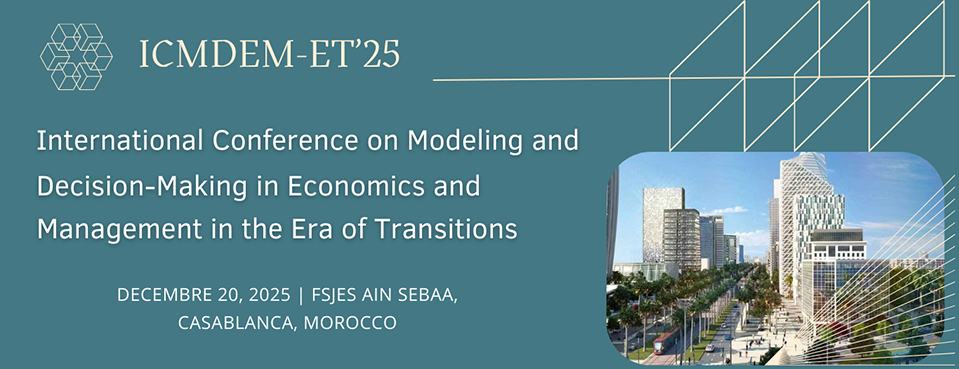Thematic Tracks
The ICMDEM-ET'25 conference covers the following tracks (but not limited to):
Track 1 : Digital Transition and Artificial Intelligence Applied to Economics and Management
- Applications of artificial intelligence and Big Data in economics, finance, and management.
- Artificial intelligence and supply chain management: process optimization.
- Predictive modeling for decision support systems.
- Machine learning for forecasting and risk analysis.
- Ethical implications and governance of AI in business.
Track 2: Economic and Financial Transition
- New models of sustainable and inclusive growth.
- Green finance and impact investing.
- Financial innovations, FinTech, and digital currencies.
- Financial inclusion and stability in a changing world.
- Modeling in industrial economics.
Track 3: Organizational and Managerial Transition
- Integrated development programs and territorial governance.
- Modeling behavior and organizational change.
- Digital transformation of organizational structures and processes.
- Leadership and strategy for adaptive organizations.
- Corporate culture and change management.
- Knowledge Management, Artificial Intelligence and Organizational Performance.
Track 4: Human Resource Management in the Era of Uncertainty
- Transformation of HR practices in the face of economic and social uncertainty.
- Managerial innovation and digitalization of HR processes.
- Governance, leadership, and internal communication during crises.
- New performance models and evaluation of HR practices.
Track 5: Social and Environmental Transition
- Circular economy and sustainable business models.
- Corporate Social Responsibility (CSR) and ESG indicators (Environmental, Social, and Governance).
- Modeling and measuring social and environmental impact.
- Policies for a just transition to a green economy.
Track 6: Modeling Methods and Tools
- Advances in quantitative and qualitative modeling.
- Hybrid approaches: simulation, optimization, and computational intelligence.
- Multi-agent modeling and complex systems analysis.
- Data visualization and communication for decision-making.
Track 7: Mobility and Transport
- Understanding and modeling urban mobility of people and goods.
- Interactions between mobility, lifestyles, and the location of households and economic activities.
- Modeling user behavior and transport stakeholders.
- Sustainable transport models and impact analysis of policies.
Track 8: Sectoral Policies
- Analysis of the processes for implementing sectoral strategies (transport, tourism, health, energy).
- Stakeholder analysis and multi-actor dynamics in policy design.
- Modeling the economic, social, and territorial impacts of past policies.
- Review and evaluation of existing projects and programs.
Track 9: Islamic Finance and Risk Management
- Risk management in participatory finance.
- Engineering and innovation in participatory finance.
- Financial innovation in Islamic economics.
- Dynamic models in Islamic finance.
- Actuarial modeling.
|


